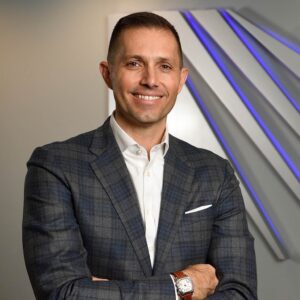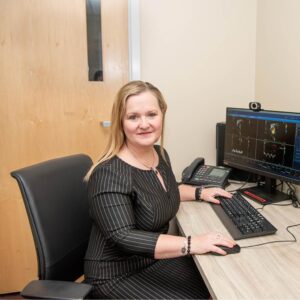How Norton Children’s is expanding services in Kentucky and Indiana
LOUISVILLE Norton Children’s has been expanding its specialty services across Kentucky and southern Indiana.
Once known primarily for having the largest pediatric hospital in the Commonwealth, Norton Children’s has grown into a pediatric health system with more than 170 locations, seeing more than 1 million patient visits from all 120 Kentucky counties last year.
A significant part of that growth includes expanding specialty care throughout the Greater Louisville and western Kentucky region. With clinics in Bowling Green, Elizabethtown, Owensboro, Paducah, and Frankfort, among others, Norton Children’s brings a variety of services — such as cardiology, neurology, and neonatal care — to families where they live and work.
Steve Hester, MD, senior vice president and chief clinical and strategy officer for Norton Healthcare, parent company of Norton Children’s, says the goal is to provide care in many locations so kids can receive treatment without having to make the drive to Louisville.
“We really want to make sure we’re doing everything we can in terms of getting access quickly and then bringing that access closer to home,” Hester says. “At the same time, we want to bring in talented physicians who are focused on a variety of pediatric specialties like GI, cancer, endocrinology, and others.”
With that in mind, Norton Children’s has made nearly $10 million of capital investments into regional communities over the past two years. “Our goal is to make it as easy as possible for families to get the care they need, where they need it,” he says.
Pediatric Cardiology
One specialty seeing significant growth throughout the region is pediatric cardiology. To meet the demand, pediatric cardiologists with Norton Children’s Heart Institute, affiliated with the UofL School of Medicine, has 16 regional office locations, including Paducah, Owensboro, Bowling Green, and Elizabethtown, which are also staffed with full-time APPs.
Last year, Norton Children’s Heart Institute saw more than 6,000 patients from outside the Louisville area, using a combination of inpatient, outpatient, and telemedicine services.
Lucinda Wright, MD, medical director of pediatric cardiology at Norton Children’s Heart Institute, along with others on the team, sees patients from before birth to young adults. Wright, a native of Bowling Green, grew up as the daughter of a dairy farmer before choosing to practice medicine. After obtaining her undergraduate degree from the University of Louisville, she attended the UofL School of Medicine. She completed her pediatric residency and pediatric cardiology fellowship at Cohen Children’s Medical Center in New York, and then returned to Kentucky.
Wright says she was drawn to pediatrics during medical school. “Pediatrics was really an easy decision for me,” she says. “After doing my pediatric and obstetrical rotations, I knew that children were really where my passion was.”
There are a growing number of cardiac issues facing Kentucky kids. Wright says most of her patients have congenital heart conditions that start in the womb. In babies born with structural defects, treatment focuses on intervention through cardiac surgery or catheters-based procedures when needed. But Wright says she’s seeing more pediatric patients with heart conditions due to lifestyle and environmental comorbidities.
“The lifestyle habits we start at a very young age definitely leave footprints for developing heart disease as you age, specifically the ones that come with poor diet and poor exercise and lifestyle habits,” she says. “We do see those at younger and younger ages now. It used to not be something that we saw in many adolescents, but we actually have an ever-growing population of teens and young adults who are developing early signs of adult-type onset heart disease, hypertension, diabetes, lipid disorders.”
As the need for pediatric cardiology continues to grow, Wright sees an even greater focus on expanding access, coordinating care among other pediatric subspecialties, and working with community partners to provide care.
Pediatric Neurosciences
Norton Children’s Neuroscience Institute, affiliated with the UofL School of Medicine, also offers pediatric neurology services throughout the region, including physical locations in Owensboro, Bowling Green, Paducah, Elizabethtown, Frankfort, and Shepherdsville.
Vinay Puri, MD, is chief of pediatric neurology at Norton Children’s. Brought up in Bombay, India, Puri obtained his undergraduate degree from KMC, Manipal, in India before coming to the U.S. where he did his training in pediatrics at Henry Ford Hospital in Detroit, followed by his training in neurology and child neurology at Washington University in St. Louis at Barnes Hospital and St. Louis Children’s Hospital.
Puri says he has treated children from all over Kentucky. “We take care of children from birth to 21 years of age. We also do consultations in fetal neurology,” he says. “Over the last 30 years, I’ve probably cared for over 120,000 children from across the region.”
Between 1995 and 2007, there were only two pediatric neurologists on staff at Norton Children’s, Puri says. Currently, they have 20 pediatric neurologists and 15 nurse practitioners providing care throughout the state. The added staff allows them to see more patients and participate in clinical trials and research. Puri says that a majority of his patients come to him with seizure disorders and migraines, but he also treats patients with abnormal movements or movement disorders like Tourette’s Syndrome, patients with cerebral palsy and development delays, and children with muscular dystrophies and other neurological diseases. Puri says in some cases, they see patients who have suffered strokes, have infections of the brain or autoimmune neurological and neuro-psychiatric disorders.
“The population of patients and the complexity of disorders is ever-growing. When I look back at a typical week I would have had 30 years ago, and then I look at what we are doing now, it is infinitely busier, and the complexity of disorders is much more,” he says. “We are also able to do so much more for these children now.”
Puri estimates the neuroscience team saw 32,000 patient visits last year. Part of the increase, he says, stems from giving patients more access to care. “We have worked very hard to provide a seamless and streamlined approach to care with the goal of improving access throughout the state,” he says.
The Future Is Now and Coming Soon
Hester says that Norton Children’s will continue to reach out into the state to provide families with innovative care and to ensure they don’t have prolonged wait times to see providers or to travel out of state.
“As a not-for-profit healthcare system, it is our goal to make sure we’re getting care for everyone, and we take that very seriously,” he says. “And when you think about our most vulnerable population and children, how do we help kids get the care they need and they need specialty care? We want to make sure that we’re doing everything we can to help children get healthy and get back to the lives that they want, and to make sure that parents feel cared for in that process.”





